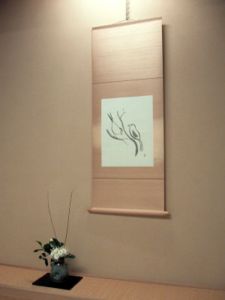What does kakemono mean?
Definitions for kakemono
ˌkɑ kəˈmoʊ noʊkake·mono
This dictionary definitions page includes all the possible meanings, example usage and translations of the word kakemono.
Princeton's WordNet
Kakemononoun
a Japanese (paper or silk) wall hanging; usually narrow with a picture or writing on it and a roller at the bottom
Wiktionary
kakemononoun
A vertical Japanese scroll painting
Etymology: From. Literally "hanging thing".
Wikipedia
Kakemono
A kakemono (掛物, "hanging thing"), more commonly referred to as a kakejiku (掛軸, "hung scroll"), is a Japanese hanging scroll used to display and exhibit paintings and calligraphy inscriptions and designs mounted usually with silk fabric edges on a flexible backing, so that it can be rolled for storage. The "Maruhyōsō" style of kakejiku has four distinct named sections. The top section is called the "ten" heaven. The bottom is the "chi" earth with the "hashira" pillars supporting the heaven and earth on the sides. The maruhyōsō style, also contains a section of "ichimonji" made from "kinran" gold thread. On observation, the Ten is longer than the Chi. This is because in the past, Kakemono were viewed from a kneeling (seiza) position and provided perspective to the "Honshi" main work. This tradition carries on to modern times.There is a cylindrical rod called jikugi (軸木) at the bottom, which becomes the axis or center of the rolled scroll. The end knobs on this rod are in themselves called jiku, and are used as grasps when rolling and unrolling the scroll.Other parts of the scroll include the "jikubo" referenced above as the jikugi. The top half moon shaped wood rod is named the "hassō" to which the "kan" or metal loops are inserted in order to tie the "kakehimo" hanging thread. Attached to the jikubo are the "jikusaki", the term used for the end knobs, which can be inexpensive and made of plastic or relatively decorative pieces made of ceramic or lacquered wood. Additional decorative wood or ceramic pieces are called "fuchin" and come with multicolored tassels. The variation in the kakehimo, jikusaki and fuchin make each scroll more original and unique.The arrival of kakemonos to the Spanish colonies in the Philippines and the Americas prompted local artists to imitate the format as a convenient way to provide portable art.
ChatGPT
kakemono
Kakemono is a type of Japanese painting or calligraphy, which is made on a silk or paper scroll designed to be hung, with a wooden strip at the top and bottom. It is typically used in traditional Japanese interior decoration and often feature landscapes, flowers, birds, or religious themes.
Wikidata
Kakemono
A kakemono, more commonly referred to as a kakejiku, is a Japanese scroll painting or calligraphy mounted usually with silk fabric edges on a flexible backing, so that it can be rolled for storage. As opposed to makimono, which are meant to be unrolled laterally on a flat surface, a kakemono is intended to be hung against a wall as part of the interior decoration of a room. It is traditionally displayed in the tokonoma alcove of a room especially designed for the display of prized objects. When displayed in a chashitsu, or teahouse for the traditional tea ceremony, the choice of the kakemono and its complementary flower arrangement help set the spiritual mood of the ceremony. Often the kakemono used for this will bear calligraphy of a Zen phrase in the hand of a distinguished Zen master. In contrast to byōbu or shohekiga, kakemono can be easily and quickly changed to match the season or occasion. The kakemono was introduced to Japan during the Heian period, primarily for displaying Buddhist images for religious veneration, or as a vehicle to display calligraphy or poetry. From the Muromachi period, landscapes, flower and bird paintings, portraiture, and poetry became the favorite themes.
Chambers 20th Century Dictionary
Kakemono
kak-e-mō′nō, n. a Japanese wall-picture or decoration, painted on silk, gauze, or paper, and mounted on cylindrical rods.
Matched Categories
Numerology
Chaldean Numerology
The numerical value of kakemono in Chaldean Numerology is: 6
Pythagorean Numerology
The numerical value of kakemono in Pythagorean Numerology is: 4
Translations for kakemono
From our Multilingual Translation Dictionary
- KakemonoGerman
Get even more translations for kakemono »
Translation
Find a translation for the kakemono definition in other languages:
Select another language:
- - Select -
- 简体中文 (Chinese - Simplified)
- 繁體中文 (Chinese - Traditional)
- Español (Spanish)
- Esperanto (Esperanto)
- 日本語 (Japanese)
- Português (Portuguese)
- Deutsch (German)
- العربية (Arabic)
- Français (French)
- Русский (Russian)
- ಕನ್ನಡ (Kannada)
- 한국어 (Korean)
- עברית (Hebrew)
- Gaeilge (Irish)
- Українська (Ukrainian)
- اردو (Urdu)
- Magyar (Hungarian)
- मानक हिन्दी (Hindi)
- Indonesia (Indonesian)
- Italiano (Italian)
- தமிழ் (Tamil)
- Türkçe (Turkish)
- తెలుగు (Telugu)
- ภาษาไทย (Thai)
- Tiếng Việt (Vietnamese)
- Čeština (Czech)
- Polski (Polish)
- Bahasa Indonesia (Indonesian)
- Românește (Romanian)
- Nederlands (Dutch)
- Ελληνικά (Greek)
- Latinum (Latin)
- Svenska (Swedish)
- Dansk (Danish)
- Suomi (Finnish)
- فارسی (Persian)
- ייִדיש (Yiddish)
- հայերեն (Armenian)
- Norsk (Norwegian)
- English (English)
Word of the Day
Would you like us to send you a FREE new word definition delivered to your inbox daily?
Citation
Use the citation below to add this definition to your bibliography:
Style:MLAChicagoAPA
"kakemono." Definitions.net. STANDS4 LLC, 2024. Web. 26 Apr. 2024. <https://www.definitions.net/definition/kakemono>.



Discuss these kakemono definitions with the community:
Report Comment
We're doing our best to make sure our content is useful, accurate and safe.
If by any chance you spot an inappropriate comment while navigating through our website please use this form to let us know, and we'll take care of it shortly.
Attachment
You need to be logged in to favorite.
Log In